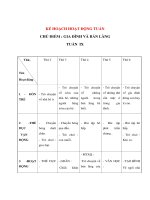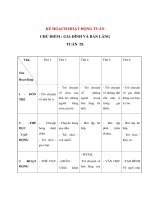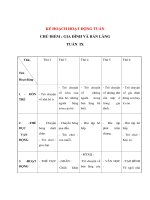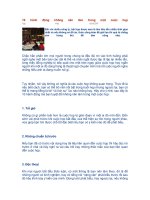Tải Giáo án Tiếng Anh lớp 9: Revision 1 - Giáo án điện tử môn Tiếng Anh lớp 9
Bạn đang xem bản rút gọn của tài liệu. Xem và tải ngay bản đầy đủ của tài liệu tại đây (121.86 KB, 5 trang )
<span class='text_page_counter'>(1)</span><div class='page_container' data-page=1>
<b>REVISION</b>
<b> A. The aims: Help Ss to revise the knowlage of the second term.</b>
<b>1. knowledge: </b>
* Vocabulary: Vobab from U6 to U10
* Grammar: the tenses, “wish” in sentences.
<b>2. Skills: reading, writing. </b>
<b> 3. Attitude: Students know to do some kinds of exercise. </b>
<b> 4. Shaping and developing students’ abilities: observing, </b>
self-management, comprehension, collaborative-learning, presentation,
communication, summarizing abilities.
<b>B. Preparations: </b>
1.Teacher: Text-book, lesson plan, reference book, excercise book.
2.Students: Text-books, notebooks, reference books...
<b>C. Procedures:</b>
<b> I/ Organization: (1')</b>
- Greeting
- Checking attendance
<b>II/ Warm-up: (5') -Ask Ss to complete the net-work</b>
Present
simple
<b>III/ New lesson: (37')</b>
Contents
<sub>Students’ activities</sub>
Teacher’s and
<b>Grammar</b>
<i><b>1. Present simple</b></i>
1.1. Usage: Diễn tả một hành động thường xuyên xảy ra, hành
động lặp đi lặp lại, một sự thật hiển nhiên.
1.2. Forms:
a. To be: (+) S + be …..
(-) S + be + not …..
(?) (Wh) + be + S …..
b. Ordinal verbs: (+) S + V(s/es) + O
(-) S + do/does + not + V + O
(?) (Wh) + do/does + S + V + O?
1.3. The signs: Adverbs of frequency
<i>never, often, usually, frequently, always, sometimes, every </i>
<i>(day/week/night/month…)</i>
*Note: Adv(fre) luôn đi trước động từ thường, nhưng đi sau động
từ TO BE và các trợ động từ (do/does/did/can...)
-T asks Ss to repeat the
usage, the forms and
the signs of present
simple tense.
-Ss answer Tʹqs.
-Ss repeat the rules
</div>
<span class='text_page_counter'>(2)</span><div class='page_container' data-page=2>
<i><b>2. Present progressive</b></i>
2.1. Usage:
Diễn tả một hành động đang xảy ra tại thời điểm nói.
2.2. Forms: (+) S + am/is/are + V-ing + O
(-) S + am/is/are + not + V-ing + O
(?) (wh) + be + S + V-ing + O ?
<i>2.3. Signs: now, at the moment, at present, right now</i>
<i><b>3.Present perfect</b></i>
3.1. Usage:
- Diễn tả một hành động vừa mới xảy ra
- Hành động xảy ra trong quá khứ mà không rõ thời gian
- Hành động xảy ra trong quá khứ và còn liên quan đến hiện tại
còn tiếp diễn đến tương lai.
- Hành động xảy ra lặp đi lặp lại nhiều lần
3.2. form: (+) S + has/have + V-pp + O
(-) S + has/have + not + V-pp + O
(?) (wh) + has/have + S + V-pp + O?
<i>3.3. Signs: (just, ever, never, already) đi sau have/has</i>
<i> (recently, lately, yet) đặt cuối câu.</i>
<i> since, for, so far, up to now, twice, three times, many </i>
<i>times, not…yet. </i>
<i><b>4. Past simple</b></i>
4.1. Usage: Diễn tả một hành động đã xảy ra trong quá khứ và
chấm dứt hẳn trong QK.
4.2. form:
a. Tobe: S + was/were …..
b. Ordinal verbs: (+) S + V-ed + O
(-) S + did not + Vinf + O
(?) (Wh) + did + S + Vinf + O?
<i>4.3. Signs: yesterday, ago, last (week/month/ year/ … )</i>
<i><b>5. Past progressive</b></i>
5.1. Usage:
-Diễn tả một hành động đang xảy ra trong quá khứ tại 1 thời điểm
xác định cụ thể.
-Diễn tả hai hay nhiều hành động cùng xảy ra trong quá khứ.
(While)
- Diễn tả một hành động xảy ra thì một hành động khác đến cắt
ngang.(When)
5.2. Forms: (+) S + was/were + V-ing + O
(-) S + was/were + not + V-ing + O
(?) (Wh) + was/were + S + V- ing + O?
<b>6. </b>
<i><b> Past perfect.</b></i>
6.1. usage.
- Diễn tả một hành động xảy ra và đã hoàn thành trong quá khứ.
<i><b>- Trong câu có hai hành động thì hành động xảy ra trước dùng ở </b></i>
<i><b>q khứ hồn thành cịn hành động sau dùng thì quá khứ đơn)</b></i>
<b>6.2.Forms: (+) S + had + V-(pp) + O. </b>
-T asks Ss to repeat the
usage, the forms and
the signs of present
progressive
-Ss answer Tʹqs.
-T asks Ss to repeat the
usage, the forms and
the signs of present
perfect
-Ss answer Tʹqs.
-Ss repeat the rules
-Ss comment on
partners’ answers.
-T comments on
-T asks Ss to repeat the
usage, the forms and
the signs of past simple
tense.
-Ss answer Tʹqs.
-T comments on
-T asks Ss to repeat the
usage, the forms and
the signs of past
progressive
-Ss answer Tʹqs.
-Ss repeat the rules
-T comments on
</div>
<span class='text_page_counter'>(3)</span><div class='page_container' data-page=3>
<b> (-) S + had + not + V-(pp) + O.</b>
<b> (?) (Wh) + had + S + V-(pp) + O?</b>
<i><b>* eg: -We had lived in Hue before 1975.</b></i>
<i><b> -After the children had finished their homework, they went </b></i>
to bed.
<i><b> = Before the children went to bed, they had finished their </b></i>
homework
<i><b>7. Future simple</b></i>
7.1. Usage: Diễn tả một hành động sẽ xảy ra ở tương lai.
<b>7.2. Forms: (+) S + will + Vinf + O. </b>
<b> (-) S + will + not + V + O </b>
<b> (?) (Wh) + will + S + V + O? </b>
<i>7.3. Signs: Tomorrow, next (week/ month …), soon </i>
<i><b>8. Near future. </b><b> (Be going to)</b></i>
8.1. Usage: Diễn tả hành động sắp xảy ra hoặc một dự định sắp
tới, một kế hoạch.
<b>8.2. Forms: (+) S + is/am/are + going to + V + O.</b>
<b> (-) S + is/am/are + not + going to + V + O.</b>
<b> (?) (Wh) + be + S + going to + V + O?</b>
<i><b>9. Wish</b></i>
<i><b>Động từ Wish = If only (ao ước) thường dùng để diễn tả những </b></i>
ước muốn, những điều khơng có thật hoặc rất khó thực hiện.
Có 3 loại câu ước.
<i>9.1.Future wish:(ước muốn ở tương lai)</i>
<b>* form: S1 + wish + S2 + would/could + V(inf) + O.</b>
<b> If only + S + would/ could + V(inf) + O.</b>
eg:- I wish I would be an astronaut in the future.
- Tom wishes he could visit Paris next summer.
- If only I would take the trip with you next Sunday.
<i>9.2. Present wish( ước muốn ở hiện tại)</i>
<b>* form: S1 + wish + S2 + V-ed + O</b>
<b> + could + V(inf)</b>
<b> + were + adj/ n </b>
<b>* Note: dùng were cho tất cả các ngôi </b>
<b> eg: - I wish I were rich (but I am poor now)</b>
- I can’t swim. I wish I could swim.
<b> - If only Ben were here (but Ben isn’t here. I wish he were </b>
here)
- We wish that we didn’t have to go to class today (but we
have go to class today)
<i>9.3.Past wish: (ước muốn ở quá khứ) (lớp 10,11,12)</i>
<b>* form: S1 + wish + S2 + had + V-(pp) +O + could have + V-(pp) + O</b>
<b>Exercises.</b>
<i><b>Ex1. Give correct form of the verbs in brackets.</b></i>
1. Be quiet ! The baby (sleep) ………
2. The sun (set)………. in the West.
usage, the forms of
present simple tense.
-Ss answer Tʹqs.
-Ss repeat the rules
-T comments on
-T asks Ss to repeat the
usage, the forms and
the signs of future
simple tense.
-Ss answer Tʹqs.
-T comments on
-T asks Ss to repeat the
usage, the forms and
the signs of near future
-Ss answer Tʹqs.
-T comments on
-T asks Ss to repeat the
usage, the forms of
sentences with “wish”
-Ss answer Tʹqs.
</div>
<span class='text_page_counter'>(4)</span><div class='page_container' data-page=4>
3. Mr Green always (go)…………. to work by bus.
4. It (not rain)……… in the dry season.
5. They (have) ………..lunch in the cafeteria now.
6. My little sister (drink)………. milk every day.
7. The doctor sometimes (return) …………... home late.
8. He (write) ………..a long novel at present.
9. Look! The bus (come)………
10. The earth (move)……….. around the sun.
11. Something (smell)…….….. good in the kitchen now.
12. His uncle (teach)……….. English in our school five years ago.
13. The old man( fall)……. as he (get) ….… into the bus.
14. When I saw him, he (sit)…………. asleep in a chair.
15. There (be)…..….. a lot of noise at the fair yesterday.
16. It (take).…. me 5 minutes to walk to school last year.
17. They (not speak)…. to each other since they quarreled.
18. I (try)…………. to learn English for years, but I (not succeed)
………… yet
19. I (not see)……… her since last week.
20. John( do)……… his homework already.
21. The train (start)…... before we arrived at the station.
22. There (be)……… an English class in this room tomorrow
evening.
23. The film already (begin)……… when we got to the cinema.
24. …………. (you/ stay)………… at home tonight?
25. I( be)……….. twenty years old next June.
26. Where are you?- I’m upstairs. I (have)…….... a bath.
27. All of them (sing)……. when I (come)………..
28. What……….. you (do)………… at 7 p.m yesterday?
29. Where………….. you (spend)………….. your holiday last year?
30. Why didn’t you listen while I (speak)………. to you?
<i><b>Ex2. Give correct form of the verbs in brackets.</b></i>
1. A: I (not see)……….. Andrew for weeks.
B: Nor me, It’s weeks since I last (see)……..… him.
2. A: What………(you/do)……… last night?
B: Well, I ……..(be) very tired, so I …..(go) to bed very early.
3. A: ………. (you/ meet) ……… Julie recently?
B: Yes, I …….(see) her a few days ago.
4. A: Are you still playing tennis?
B: No, I …..(not be) able to play tennis since I (break) ……… my
arm.
5. A: What part of birmingham. ……… (you/live) ……… when you
…….. (be) a student?
B: A place called Selly Oak ……. (you/ever/be) there?
<i><b>Ex3. Give correct form of the verbs in brackets.</b></i>
1. She wishes her father ( be)_____ here now to help her
2. I wish they (visit) ______us when they were in town.
3. I wish someone (give) ______ me a job next month.
-Ss comment on
partners’ doing
-T comments on
-T gives some exrcises
-Ss take note and do
-T gives the keys.
Ex1.
1. is sleeping
2. sets
3. goes
4. does not rain
5. are having
6. drinks
7. returns
8. is writing
9. is coming
10. moves
11. smells
12. taught
13. fell / got
14. was sitting
15. was
16. took
17. have n’t spoken
18. have tries
19. have not seen
20. has done
21. had started
22. will be
23. had already begun
24. will you stay
25. will be
26. am having
27. were singing; came
28. were …. doing
</div>
<span class='text_page_counter'>(5)</span><div class='page_container' data-page=5>
4. If only I ( can take) _______the trip to Hanoi with her next
summer.
5. I wish they (know) _______ the truth yesterday.
6. I wish I (see) _______ that film on TV again.
7. We wish she (be) _______ our teacher of English.
8. My brother wishes he (not waste) ______ time when he was
young.
9. They wish they (come) _______ to class on time yesterday
morning.
10. I wish I ( spend) _______ my last summer vacation in the
mountains.
11. I wish she (come) _______ to see me yesterday.
12. If only I ( have) ________more time to do this job.
13. He missed an exciting football match on TV last night. He
wishes he (watch) ________ it.
14. I wish you (not give) ________them my phone number
yesterday.
15. We wish we (understand) _______all the teacher’s
explanation yesterday.
Ex2.
1. haven’t seen
saw
2. did you do
was ; went
3. have you met
saw
4. haven’t been ; broke
5. did you live ; were
have you ever been
Ex3
1. were 2.
visited 3.
would give
4. could take
5.had known
6. would see
7.were 8.
had not wasted
9. had come
10. had spent
11. had come
12. had
13. had watched
14. had not given
15. had understood
<b>IV/ Consolidation:(1' )</b>
- Grasp the main points of this lesson.
<b>V/ Homework:(1')</b>
- Review this part carefully.
</div>
<!--links-->









